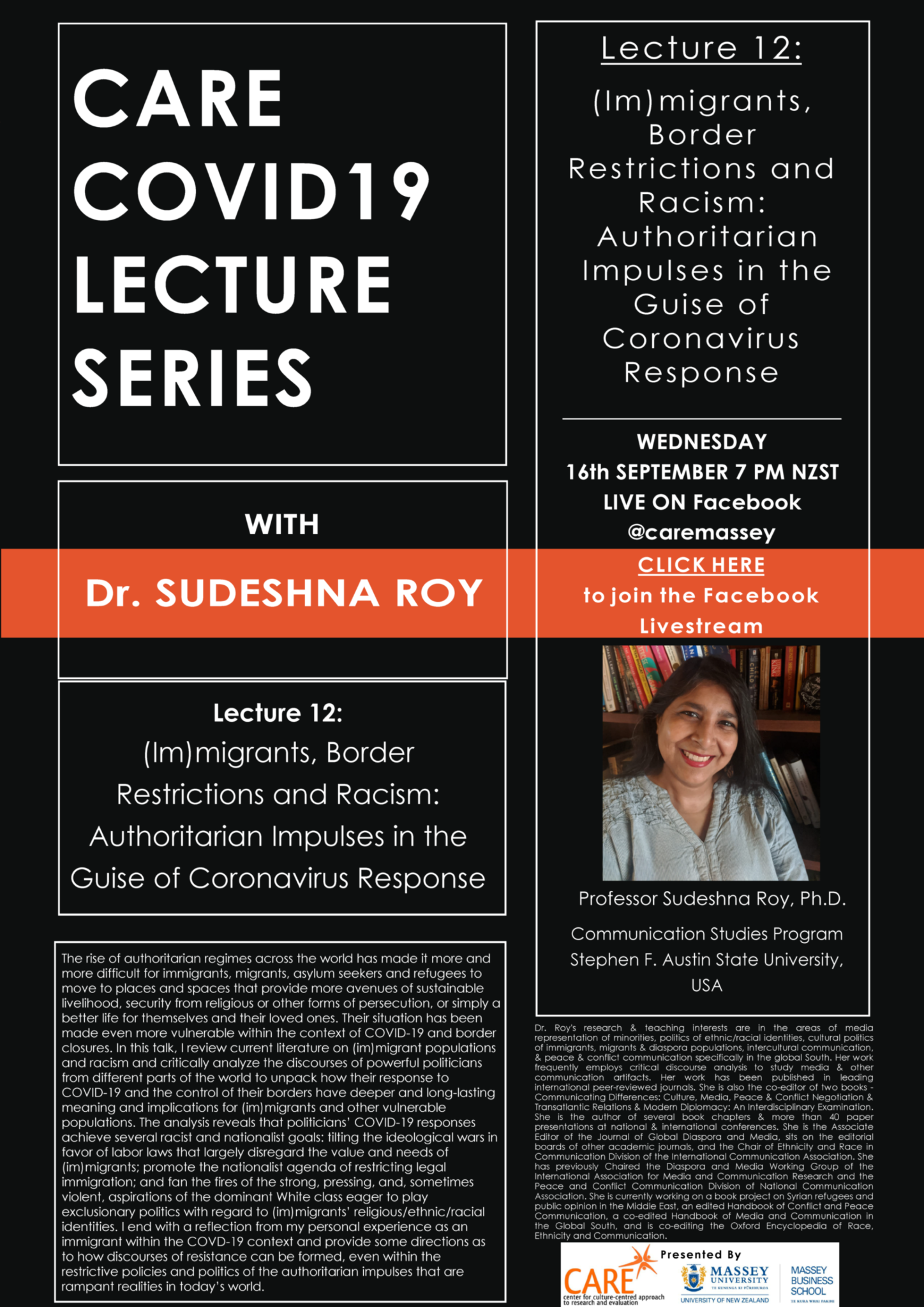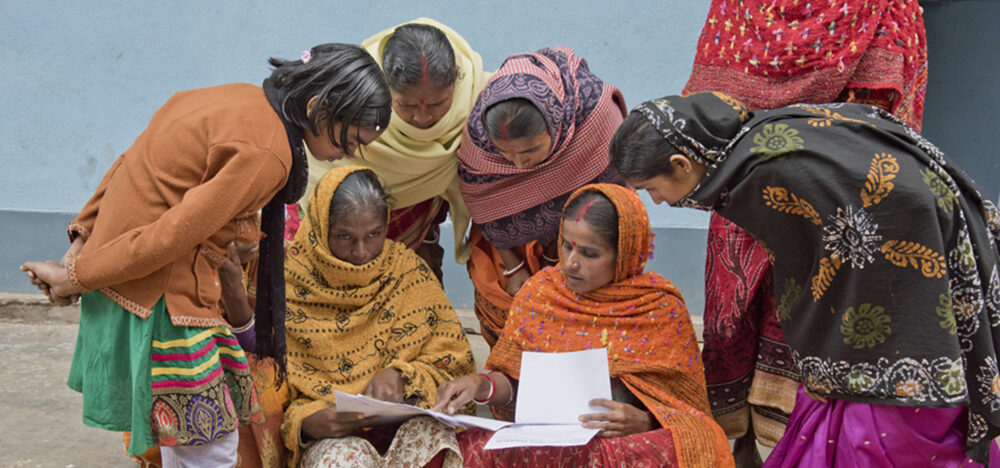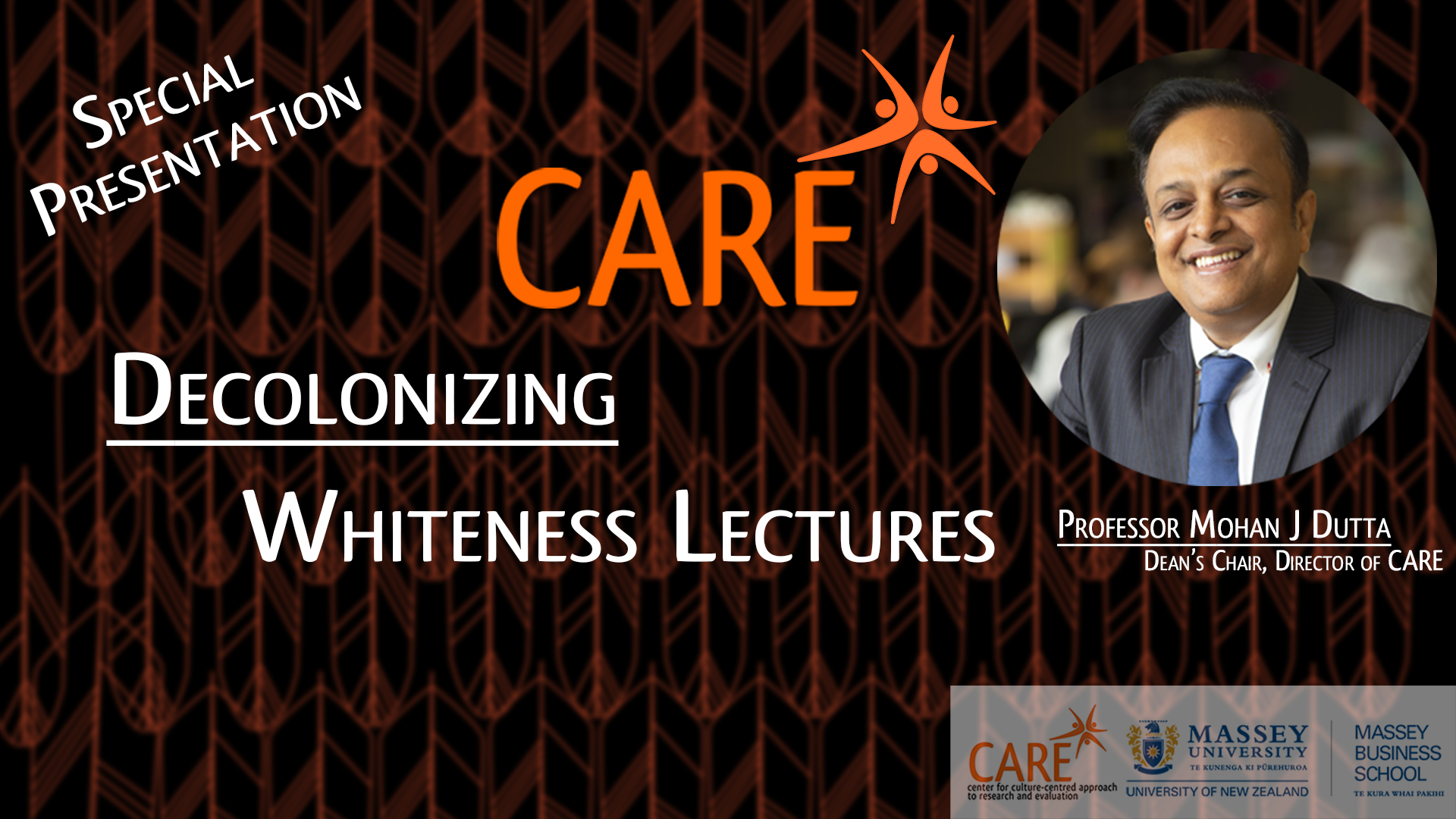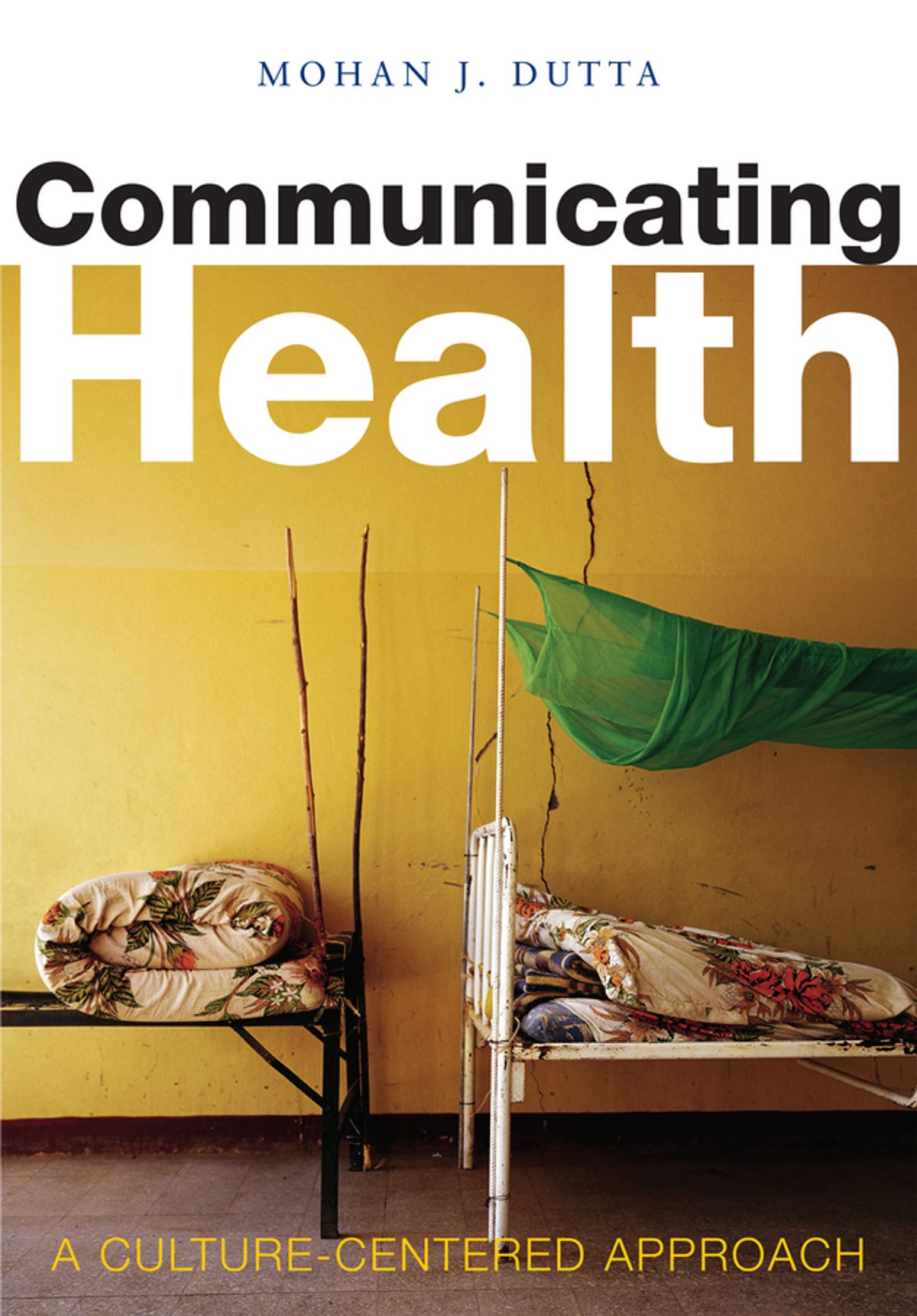Stay tuned for more information on the new Lecture Series or follow us on our Facebook: https://www.facebook.com/CAREMassey & Twitter: https://twitter.com/CAREMasseyNZ pages for the latest updates.
Monthly Archives: September 2020
Professor Mohan Dutta Wins Prestigious Charles H. Woolbert Research Award and Golden Anniversary Monograph Award from the National Communication Association
CARE Facebook: https://www.facebook.com/CAREMassey/posts/4073794152636959
Mohan J. Dutta, Dean’s Chair Professor of Communication at Massey University and Director of the CARE: Center for Culture-Centered Approach to Research and Evaluation C, recently received the 2020 Charles H. Woolbert Research Award and the Golden Anniversary Monograph Award from the National Communication Association (NCA). Given annually, the Charles H. Woolbert Research Award honors a journal article or book chapter that has stood the test of time and has become a stimulus for new conceptualizations of communication phenomena. Dr. Dutta was recognized for the article, “Communicating about Culture and Health: Theorizing Culture-Centered and Cultural Sensitivity Approaches,” published in Communication Theory in 2007. Dr. Dutta’s paradigm-shifting critical-theoretical and applied intervention into health communication contexts and practices, addresses structural inequalities and centers the voices of those struggling on global margins. “Communicating about Culture and Health” changed the discipline, expanded cross-disciplinary and cross-methodological collaboration, and influenced curricula in medical schools as well as clinical practice.
Cited more than 600 times, in more than a dozen languages, on every continent, this article has directly shaped projects benefitting “marginalized communities around the world, ranging from immigrant, African American, and First Nations communities in the United States and Canada, to migrant workers communities throughout South Asia, Southeast Asia, and the Middle East, to minoritized communities in South Africa, South America, and more.”The Golden Anniversary Monograph Award is given annually to honor the most outstanding scholarly monograph(s) published during the previous calendar year. Dr. Dutta was recognized for the article, “‘Communication sovereignty’ as Resistance: Strategies Adopted by Women Farmers Amid the Agrarian Crisis in India,” published in the Journal of Applied Communication Research in 2019 with Dr. Jagadish Thaker. Drs. Dutta and Thaker’s article is based on five years of participatory research with women farmers in southern India. The article highlights how women from oppressed caste communities in southern India come together to organize for increased economic and political power. The intervention that this article develops and emerges from addresses one of the most pressing issues of our time: food.“NCA’s annual awards honor communication scholars’ teaching, scholarship, and service,” NCA Executive Director Trevor Parry-Giles said. “NCA is proud to recognize Dr. Dutta’s significant contributions to the Communication discipline with this award.”Dr. Dutta’s award will be presented virtually on November 21 at the NCA 106th Annual Convention. For more information about NCA’s awards program, visit http://www.natcom.org/awards/.
About the National Communication Association:
The National Communication Association (NCA) advances Communication as the discipline that studies all forms, modes, media, and consequences of communication through humanistic, social scientific, and aesthetic inquiry. NCA serves the scholars, teachers, and practitioners who are its members by enabling and supporting their professional interests in research and teaching. Dedicated to fostering and promoting free and ethical communication, NCA promotes the widespread appreciation of the importance of communication in public and private life, the application of competent communication to improve the quality of human life and relationships, and the use of knowledge about communication to solve human problems. NCA supports inclusiveness and diversity among our faculties, within our membership, in the workplace, and in the classroom; NCA supports and promotes policies that fairly encourage this diversity and inclusion.
For more information, visit natcom.org, follow us on Twitter at @natcomm, and find us on Facebook
#ResearchAwards #NationalCommunicationAssociationAwards #CharlesHWoolbertResearchAward #GoldenAnniversaryMonographAward
CARE COVID19 Lecture Series #12- (Im)migrants, Border Restrictions and Racism: Authoritarian Impulses in the Guise of Coronavirus Response – with Professor Sudeshna Roy, Stephen F. Austin State University, Texas

Wednesday, 16th September 2020 @ 7PM NZST
Facebook Livestream: @CAREMassey
Link:
https://www.facebook.com/CAREMassey/videos/638665510413217/
Abstract:
The rise of authoritarian regimes across the world has made it more and more difficult for immigrants, migrants, asylum seekers and refugees to move to places and spaces that provide more avenues of sustainable livelihood, security from religious or other forms of persecution, or simply a better life for themselves and their loved ones. Their situation has been made even more vulnerable within the context of COVID-19 and border closures. In this talk, I review current literature on (im)migrant populations and racism and critically analyze the discourses of powerful politicians from different parts of the world to unpack how their response to COVID-19 and the control of their borders have deeper and long-lasting meaning and implications for (im)migrants and other vulnerable populations. The analysis reveals that politicians’ COVID-19 responses achieve several racist and nationalist goals: tilting the ideological wars in favor of labor laws that largely disregard the value and needs of (im)migrants; promote the nationalist agenda of restricting legal immigration; and fan the fires of the strong, pressing, and, sometimes violent, aspirations of the dominant White class eager to play exclusionary politics with regard to (im)migrants’ religious/ethnic/racial identities. I end with a reflection from my personal experience as an immigrant within the COVD-19 context and provide some directions as to how discourses of resistance can be formed, even within the restrictive policies and politics of the authoritarian impulses that are rampant realities in today’s world.
For more info visit: https://www.facebook.com/CAREMassey
#Immigrants#BorderRestrictions#Racism#AuthoritarianImpulses#CoronavirusResponse#COVID19 #CAREMassey#CARECOVID19LectureSeries #MasseyCJM#MasseyUni
Professor Mohan Dutta’s book – “Communicating health: A culture-centered approach” receives Outstanding Book Award from the National Communication Association Health Communication
CARE: Center for Culture-Centered Approach to Research and Evaluation team congratulates Professor Mohan Dutta on the Outstanding Book Award from the National Communication Association Health Communication Division to his book, “Communicating health: A culture-centered approach” published with Polity. The book lays out the foundational concepts of the #CultureCenteredApproach (CCA), a meta-theoretical framework for health communication organizing, advocacy, and activism directed at transforming the deeply unequal structures that constitute health inequalities. The impact of the book, and its key theoretical argument on the CCA is felt globally, shaping two decades of health activism, health communication solutions, health interventions, and advocacy to shape health policy. Most vitally, the framework put forth in the book is recognized by global policy organizations including the World Health Organization (WHO) Europe and the United Nations Educational, Scientific & Cultural Organization UNESCO, as a lens for exploring the connections between culture and health. Cited over 485 times across #CommunicationStudies, #MedicalAnthropology, #Geography, #Sociology, #PublicHealth and #Medicine, the book has formed the basis of over 200 MA theses and doctoral dissertations.
#CultureCenteredApproach#CARECCA#CAREMassey#MasseyCJM#MasseyUni#NationalCommunicationAssociation#HealthCommunication#CommunicatingHealth#WorldHealthOrganisation#UNESCO#PolityPress
CARE WHITE PAPER ISSUE 10: Digital Hate and the infrastructures of communicative capital
by Prof. Mohan Dutta,Director, CARE Massey University
Communicative capital, the consolidation of communicative infrastructures to drive profiteering, forms the face of twenty-first century neoliberalism. From Facebook to Amazon, digital communication is one of the most profitable sites of capitalist expansion.
Communicative capital is intertwined with financial and technological capital, drawing on the global networks of finance and simultaneously creating new sites and spaces for financialization.
Communicative capital works through the commercialization of human participation on digital platforms, turning likes, shares, and comments into profitable resources.
Of the wide array of human emotions on digital platforms that drive profiteering, hate is a powerful resource that draws in viewers, propels shares, and creates networks of flow. Hate has the potential of generating large profits because of its virality.
#CAREMassey #carewhitepaper #DigitalHate #Infrastructures #CommunicativeCapital
Dutta, M. J. (2020, September). Digital Hate and the infrastructures of communicative capital. CARE White Papers, 10. http://carecca.nz/2020/09/03/care-white-paper-issue-10-digital-hate-and-the-infrastructures-of-communicative-capital/






